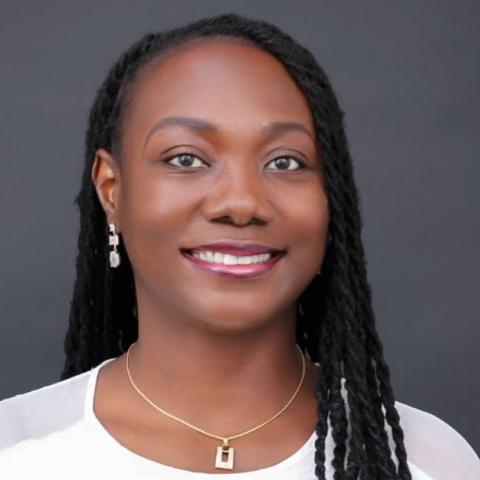ACEIR researcher appointed as first female professor of economics at University of Ghana

The year is ending on a high note for ACEIR researcher Nkechi S. Owoo since she was promoted to full professor of economics at the University of Ghana (UG). Not only is she the first female to be capped in this capacity at that university, but she is also only the third female full professor of economics in the country.
Prof. Owoo started her academic journey at Clark University, Massachusetts, where she completed her postgraduate studies and received her PhD in Economics in 2012. Her research spans gender economics, health and demographic economics, poverty, inequality, and environmental sustainability, with additional interests in spatial econometrics and climate change.
As a member of the Ghana research node since ACEIR’s establishment in 2018, Prof. Owoo is a much-valued contributor to the centre’s research and capacity building agenda. She is part of the respective teams who published the Inequality Diagnostics for Ghana; profiled pandemic-related lockdown readiness and COVID vulnerability; and participated in a multi-country and multidisciplinary research project for transforming social inequalities through inclusive climate action – to name but a few.
We asked Prof. Owoo to share her reflections on what the promotion to full professor means for her; what she enjoys about her profession; her aspirations for the future; and what advice she has for young female researchers at the start of their academic careers.
As the first female professor of economics appointed at UG, what does this achievement mean for you – both on a personal and professional level?
On a personal level, it represents years of hard work, discipline, and focus. It reminds me of the incredible people I have in my corner – my mentors, colleagues, students. My family, whose unwavering support grounded me. But most of all, it reminds me of His promise of being with me always. I could not have accomplished this alone, and my gratitude, appreciation, and acknowledgement go to the whole village that stood by me, believed in me, and journeyed with me. It truly took a village, and I am profoundly thankful.
On a professional level, this achievement affirms the value of rigorous policy relevant research that engages real-life issues. It is an acknowledgment of the importance of excellence in teaching, research, and public service. It is also a testament to the power of collaboration and the enduring importance of intellectual curiosity. It is an affirmation that the field remains open to new voices, perspectives, and ideas that challenge us to think more inclusively and creatively about the world that we live in.
What do you enjoy most about being an economist and academic?
I like asking questions and having the tools to answer them – especially when the questions are hard, but the answers are meaningful and can change lives. I love the community of researchers and collaborators who challenge me to think differently: “Have you thought about it this way instead?”
I cherish the “Aha!” moments when the data, the technique, and the story align to shed a little more light on what we know and on what we can change about the world we live in.
I also love teaching my students. I understand the trepidation that sometimes comes with taking on economics, as if it’s an insurmountable feat! I remind them it’s not – it simply requires hard work and focus. I treasure the emails from former students sharing their successes and the short messages when they check in. It is a blessing to do what I do and to make these connections.
Now that you’ve reached this professional milestone, what are your aspirations for the future?
I’ve been getting this question quite a lot! I almost replied once that it’s time to take a loooooong holiday! But no – while I do feel a slight shift in my interests toward more administrative and leadership roles, I don’t think I’m quite done yet with my academic journey. Research and mentoring still bring me immense fulfilment, and there’s more work to be done in strengthening the systems that support young researchers and evidence-informed policy in Africa.
What advice would you give to young female researchers who aspire to a career in academia?
Academia can be demanding, especially when other responsibilities pull you in different directions. However, it will be important to be intentional about building research depth and also finding your voice. So, write about the topics that you care about; about the change that you want to see. A proverb says that alone, you may walk quicker; but with others, you can walk further. So, don't be afraid to ask for help when you need it. The moments of doubt and fatigue will come, almost surely. These moments do not define you. Give yourself some grace and take a break when you need it. But then get up the next moment, as soon as you are able, and keep going.
Most importantly, when you get to where you want to be, remember to reach back and bring other young researchers, other women, along with you.
The ACEIR team is very proud to call Prof. Owoo our colleague. There is no doubt that she will continue to be a trailblazer as she follows the first two full professors of economics in Ghana, Prof. Grace Nkansah and Prof. Eugenia Amporfu (both from the Kwame Nkrumah University of Science and Technology).
